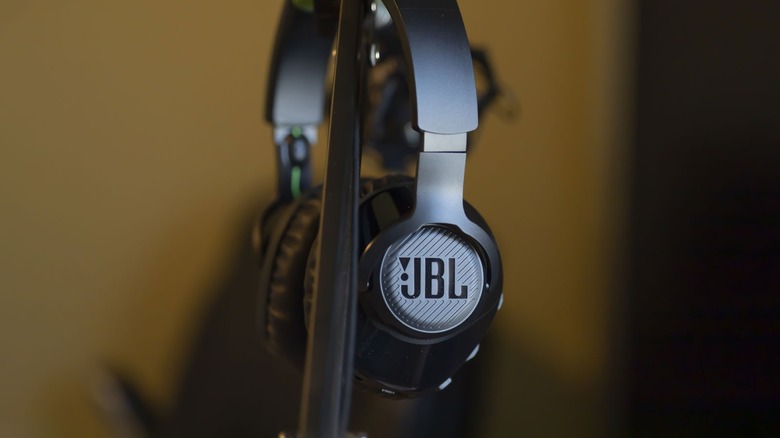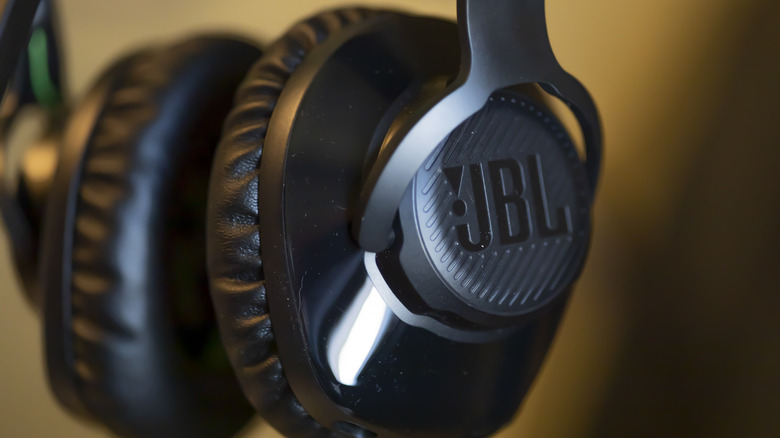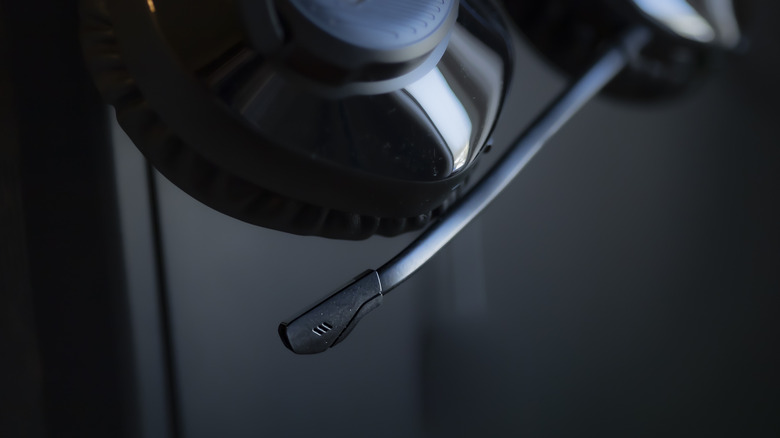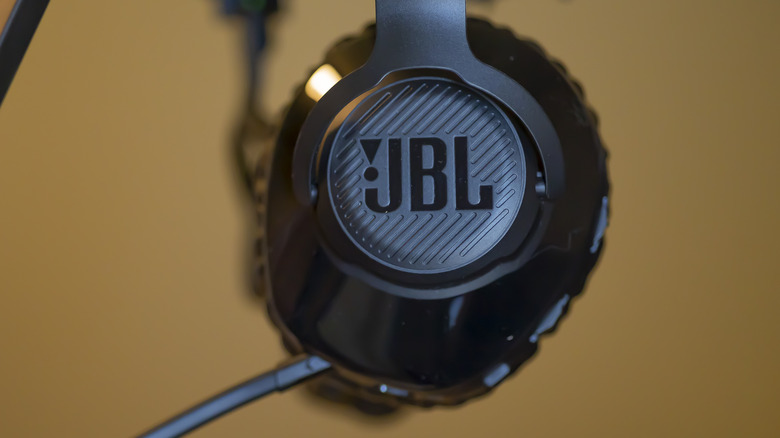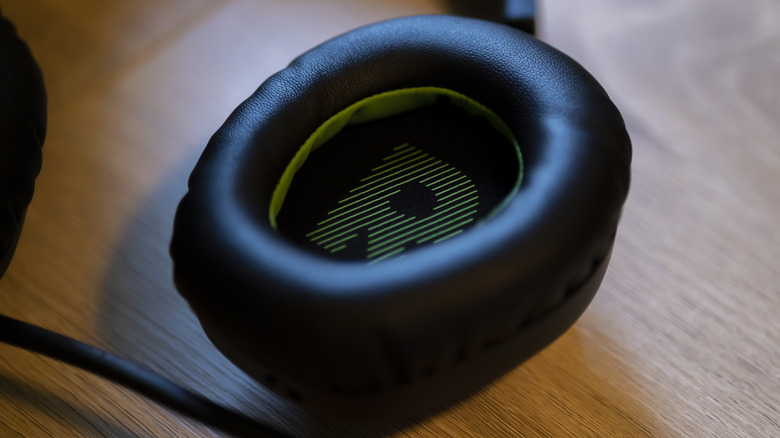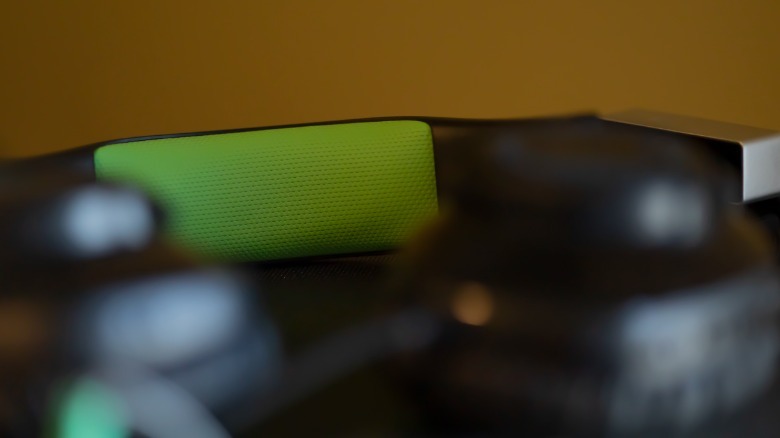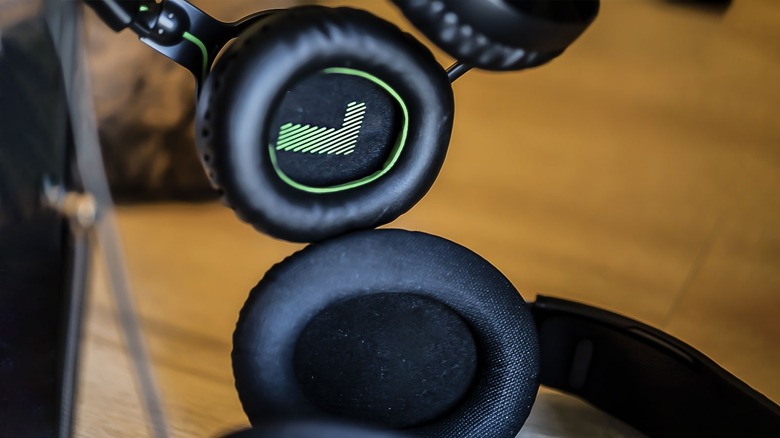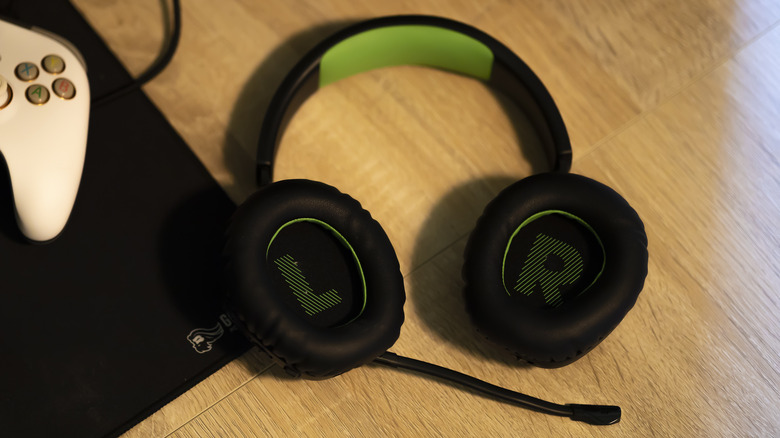JBL Quantum 910X Review: Xbox Gaming Headset With Spatial Sound And A Few Small Issues
- Excellent spatial sound
- Ear cushions are extra plush
- Long battery life
- Easily accessible audio control
- Chat and game audio control separation
- Headset fit and comfort aren't universal
- A pricy option
- Microphone is average
As longtime JBL fans can attest, this brand's products can withstand years of rigorous use. That's about where my standard for headphones and earbuds sits; not a pretentious audiophile by any means, but willing to pay good money for something that holds up to regular use and is capable of dynamic, quality sound.
Many casual audiophiles' personal association with JBL stops at poolside waterproof speakers and rubber running earbuds. The brand would like users to become reacquainted with its products in a new light: gaming audio.
JBL has only begun dipping its toes in that water a few years ago when it debuted the Quantum line of products. Headsets are an unexpectedly important purchase when assembling a gaming setup. You need something comfortable, with a long-lasting battery, and excellent sound — and hopefully with a good balance struck between build quality and affordability. JBL's Quantum line recently expanded, including the JBL Quantum 910X, a new wireless gaming headset optimized for Xbox, as part of this brand's still relatively early foray into gaming peripherals. JBL provided a headset for the purpose of this review.
JBL's newest Quantum Series expansion
The JBL Quantum Series gaming audio family expansion this year brings console-specific options to the lineup. In addition to the Xbox-optimized Quantum 910X headphones, there's also the 910P — an identical version of the set but geared towards PlayStation. A perk of the 910X is that according to JBL, this model 910X can be used with PlayStation, while the 910P can't be used with Xbox. The preferred differentiation is, for the most part, aesthetics; the 910X is black with accents in the trademark Xbox green, while the 910P is white with streaks of blue (catered towards the PlayStation 5, obviously).
Similar X and P versions of the Quantum 360 headset, which uses slightly smaller drivers and has a shorter battery life, were also released. The 360s and the 910s both utilize DualSOURCE, which allows the headphones to connect to your console and your phone so calls can be answered mid-game. The brand announced its Quantum TWS Air earbuds, too — we're looking forward to giving these earbuds a spin, as well, with the claim to spatial audio through JBL QuantumSURROUND tech and a four-microphone system for crystal-clear communications. The TWS Air buds should be available later this summer, while the 910X, 910P, 360X, and 360P are available now.
Microphone design and performance
The microphone on the JBL Quantum 910X is conveniently detachable, which could be a benefit for players that utilize multiple consoles and switch back and forth between multiplayer and solo gaming. The mic can still be flipped up to instantly mute your mic as well as other conversation, a feature included even with the detachable microphone that comes in handy frequently.
The noise and echo suppression was only somewhat effective when they should deliver something a bit more powerful and bulletproof at this price point. The included windshield foam on the microphone was used, which seemed to help mute some ambient noise but detrimentally affected the crispness of spoken words. The sound quality on the receiving end of the microphone was reported back as "satisfactory," with a slight fuzziness throughout transmission.
Testing revealed quite a bit more echoing occurring with the JBLs than there ever was with previously used go-to headsets. Keyboard clicks and clacks were picked up and reverberated by the mic — even with the windshield on — to the aggravation of lobby members. Fortunately, though, there didn't seem to be any issues with the headset mic's 2.4 GHz low latency system, despite these being wireless headphones.
Sound quality and speaker performance
Any discouragement felt from the Quantum 910X's microphone performance was quickly snuffed out by the sound performance of these headphones. They use a suite of proprietary JBL technology — QuantumSPATIAL 360 on Xbox/PlayStation/Nintendo Switch, QuantumSPHERE 360 on PC (Windows), and Quantum SURROUND — to create a spatial, 3D audio experience outshining the sound integration of any other headset I've personally used.
According to the manufacturer, the headset utilizes its equipped sensors to track precise movements of the head to create the illusion of a new 360-degree sound reality. Footsteps from behind were realistic enough to make the skin on my neck crawl, and cars racing by feel so real that you might as well have been standing on the sideline of a Formula One circuit. It wasn't so much that the JBLs capture an unprecedented detail and richness in sound — they do perform very well in that regard, but not the absolute best, especially by the standard of music-obsessed audiophiles — but it was the spatial placement, the sensation of movement and depth for real-life sounds like gunfire and cars and footsteps, and finely-tuned volume of different sounds that demonstrated how JBL truly has an optimized audio gaming experience in mind.
If you really want to get picky about the sound performance, peripheral support is available through the JBL QuantumENGINE software — here, you can calibrate the headset and fine-tune the 3D sound, plus create your preferred RGB effects. And the active noise cancellation worked stupendously well.
Comfort and wearability
The JBL headset was quite comfortable even for someone who is incredibly prone to headset-related headaches. The earpiece memory foam cushions were thick and plush, preventing discomfort for extended gaming sessions. The leather material of the cushions was also soft enough for prolonged wear whereas many other headsets with similar cushions end up being scratchy and irritating to the skin. There is some worry that this sort of leather material will wear thin and crack over time, though.
The head cushion on the headset's underside was also plush and thick, but it should have been extended further across the headset to provide comfort to more than just the crown. I didn't personally experience pressure on the sides of my head from this headset, but when a second tester gave them a test spin, they felt that the JBLs were squeezing on the temples after a while.
The second tester, who prefers a set that will accommodate a bigger head and bigger ears, also felt that the can cushions could be quite a bit larger, especially given the JBL's price. While smaller ears fit soundly within the cushions, that may not be the case for others. I was able to comfortably wear the JBLs for a couple of hours, although they do feel a bit heavier than other sets I've used in the past.
JBL Quantum 910X vs. other gaming headsets
The JBL Quantum 910X headphones retail for $299.95 from JBL. When there are tons of cheap, gets-the-job-done headsets available for less than $100, nearly three times that amount is a tough ask. One example of a pair of headphones that seems to get the comfort part of the equation right goes by the name Philips SHP9500s — they can be found for $79.99 on Amazon. Those headphones have significantly bigger earpieces, as pictured in the side-by-side comparison, have padding throughout the underside of the support band, and feel less constrictive and heavy after prolonged play. The sound is less dynamic, though, and there's no microphone.
On the other end of the price scale is my own daily driver, a pair of SteelSeries Arctis Nova Pro wireless headphones, which can be had for $349.99 on Amazon. I found SteelSeries' peripheral software and equalizer customization to be superior to JBL's. The Arctis Nova is more padded and comfortable than JBL's, and the spatial audio performance between the two is pretty neck-and-neck. The Arctis Nova Pro headset also allows for two independent games and chat audio streams on a 2.4 GHz connection, and the SteelSeries mic is definitely more capable of delivering clear, distortion-free audio. Knowing what I know now about both headsets, the Arctis Nova Pros are still a preferred choice because of their fully comfortable headphone fit and the quality mic for chatting with long-distance gaming friends. JBL was a bit too stingy with the headband padding, too.
Is the JBL Quantum 910X worth it?
There was a lot to like about this headset. The battery life is fantastic — reported by JBL to be about 37 hours of playtime, which we found to be relatively accurate — and you can charge the set while using it. With the Dual Source separate sound cards feature, you can independently control game audio and chat audio streams, and the thoughtfully-placed controls on the headset make muting and volume changing quick and effortless.
The earpiece cushions, while plush and comfortable, could have been a bit bigger to accommodate more gamers. And the microphone was underwhelming for the price of the set. But I really, really enjoyed the immersive experience of the 3D audio and found the sound quality impressive enough to redeem the average-at-best mic. Even though the comfort of this headset's fit is inconsistent and they might not end up being a good fit for you because of it, don't write the JBLs off. Especially if you're not a streamer and only occasionally play co-ops or want to chat with other players, the JBL Quantum 910s are worth a try whether your console of choice is Xbox, PlayStation, PC, or Nintendo Switch, to experience game sound in a way you likely haven't before.
